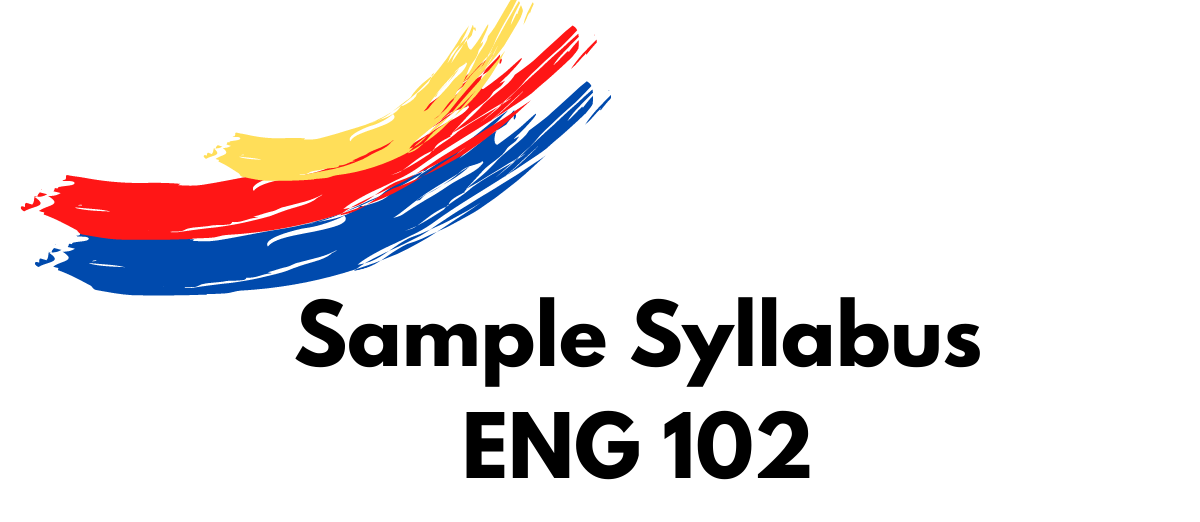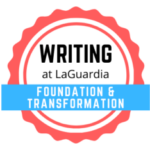
English 102 – Composition II: Writing Through Literature
Sections 0881 & 0883
Fall I 2020 | 3 Credit Hours
Lecture-Discussion-Workshop
Contact Information:
Instructor: Professor Paul Fess
Instructor Email: [email protected]
Class Meetings: Asynchronous; complete the work each week at your own pace; just make sure you turn it in by
week’s end
Virtual office hours: Mondays & Wednesdays 11:00-1:00 (or by appointment)
Blackboard Collaborate
Course Description:
Section Description: This semester you will address the broad question of how written texts make meaning. Specifically, we will focus on literary texts
From the Course Catalog:
This course extends and intensifies the work of Composition I, requiring students to write critically and analytically about culturally-diverse works of literature. Students are introduced to poetry, drama, and fiction, employing close-reading techniques and other methodologies of literary criticism. Students will utilize research methods and documentation procedure in writing assignments of varying
academic formats, including a research essay that engages literary critics or commentators. Admission to the course requires completion of Composition I.
Student Learning Outcomes & Objectives
Please see the “Introduction to English 102” handout
At the end of this course, you will be able to…
1. Demonstrate understanding of writing as a process that involves pre-writing, drafting, revising, editing, proofreading, critiquing and reflection. 2. Write clearly and coherently in varied academic formats (such as response papers, blogs, formal essays, and research papers) with an emphasis on writing as a critical thinking process. Essays will vary in length between 600 and 2000 words, using standard written English (SWE).
3. Interpret and write critically about poetry, drama, and fiction while applying techniques of literary criticism including the close reading of literary texts. 4. Identify and evaluate forms of literary analysis, such as biographical context, historical context, and critical theory.
5. Read and write critically and analytically, including identifying an argument’s major assumptions and assertions and evaluate its supporting evidence and conclusions. As part of this process of inquiry and problem solving, students will be able to understand audience, voice, context and purpose.
6. Support well-reasoned arguments with evidence and communicate persuasively over a variety of contexts, purposes, audiences, and mediums. 7. Demonstrate an understanding of research methods including the use of appropriate technology and the ability to synthesize primary and secondary sources, while employing the conventions of ethical attribution and citation and avoiding plagiarism.
8. Write in class to strengthen writing skills and strategies.
Resources:
● What technology or materials will I need?
○ I have tried to make most material accessible across different kinds of electronic devices (computers, phones, tablets), so you should be able to do the work with the hardware you already have. Of course, if you have difficulties accessing the material let me know ASAP.
○ I will also include captions for screencasts and other methods of making course material accessible, but if this does not meet your needs please let me know.
● All course material can be found on our course site.
Password: DonBenito
Papers & Projects
● Paper 1 (10%): This will be an essay in which you analyze, or “close read,” a poem. Word count: 1000
● Paper 2 (20%): This will be an essay in which you analyze Benito Cereno, by Herman Melville. Word count: 1200
● Paper 3 (20%): This will be your final project in which you will analyze the play A Raisin in the Sun by Lorraine Hansberry and the film adaptation directed by Daniel Petrie Word count: 1500 words
● Reading responses & Blog posts (25%): Throughout the semester there will be blog posts due. Generally, you will respond to questions I pose to the class; these will typically ask you to find and discuss material from the Web that deals with the material we’re reading. Word count: around 200 words. (As part of these assignments, I would also like you to respond to at least one of your classmate’s posts.)
● Annotations (25%): Throughout the semester you will annotate the literature we are analyzing using our Manifold course site.
Attendance is counted by the tasks you complete. If you miss a task/assignment, you will be counted absent for that week/class. If you miss more than 8 hours of class, you will earn a failing grade, as per LaGuardia’s handbook.
What You Can Make Up
• Making up missed work does not erase absences. Again, you should strive to attend every class meeting.
• You may make up major-grade work (such as papers or tests) if class was missed due to legitimate circumstances beyond your control (i.e., a documented illness or medical emergency; a family funeral; activities at which you officially represent the College). If such circumstances should arise, please promptly communicate them to your instructor.
• You may make up major-grade work missed due to absences for other reasons only with the consent of your instructor.
• You may arrange to turn in major-grade work in advance or online only if allowed by your instructor.
What You Can’t Make Up
• Class discussions, group work, in-class writing, or other daily class work in a writing class cannot be reconstructed. Therefore, daily work missed due to absence or tardiness cannot be made up. Missed daily class work will have a negative impact on your grade!
Revision Policy:
Students are allowed to revise their first two at-home papers for an improved grade, if they follow these rules: 1) students must have turned in the first and final drafts on time. 2) students wishing to revise their papers must meet with me and present a revision plan. (This will be a detailed, written course of action to address the comments I gave you on your graded essay.) 3) students must turn in the revised paper within TWO WEEKs of getting the first grade.
Online Environment
I want everyone to have a good experience in this class. Be respectful of each other’s differences, and help me foster a class environment where everyone feels empowered to learn. If something in this class makes you uncomfortable, please let me know. I will do my best to remedy the situation.
Plagiarism
It WILL NOT BE TOLERATED. We will talk about plagiarism in class, but please note: Any paper exhibiting plagiarized work will fail immediately, thereby lowering your overall final grade. If the case is severe (more than one or two sentences), you will also fail the course, and your work will be reported to the college via an Academic Integrity Complaint. The LaGuardia Community College Policy on Academic Integrity can be found here:
http://library.laguardia.edu/files/pdf/academicintegritypolicy.pdf
Emergency Communications Policy
If I have to unexpectedly cancel class for any reason, please check your LaGCC email or look on our Blackboard page for instructions. You may need to submit work or complete tasks to keep us on track for the semester.
Accessibility
Please let me know, in person or by email, if you have any accessibility issues with the course. You can also register with the Office for Students with Disabilities (OSD), which provides services for students with disabilities to ensure access to College programs. They offer personal, academic, career, and accommodations counseling, evaluation referrals, testing for learning disabilities, and adaptive/assistive technology. They are located in M 102, and can be reached at (718) 482-5279 (TTY x6057). http://www.lagcc.cuny.edu/osd/
Schedule
Poetry
Week 1 (09/14-09/18)
Part 1: Welcome!
Watch: Introductory video, register for CUNY Academic Commons
Familiarize yourself with our course page
Respond: Introductory blog post
Part 2: Read: “What is Literature and Does It Matter?,” Literary Theory: a Very Short Introduction by Jonathan Culler
Respond: Reading questions about “What is Literature and Does It Matter?,” Literary Theory: a Very Short Introduction by Jonathan Culler
Week 2 (09/21-09/25)
Part 1: Read: Finish: “What is Literature and Does It Matter?,” Literary Theory: a Very Short Introduction by Jonathan Culler
Respond: Question on course blog
Part 2: Watch: Video about annotations
Read: “Yet Do I Marvel” by Countee Cullen
“Theme for English B” by Langston Hughes
Annotate these poems according to the guidelines in my announcement.
Week 3 (09/28-10/02)
*NEW* Use hypothesis to annotate Paper 1 assignment with any questions or confusion you have about the prompt
Part 1: Watch:
Read: “Literature, Meaning, and Interpretation,” Literary Theory: a Very Short Introduction by Jonathan Culler
Respond: Reading question about “Literature, Meaning, and Interpretation,” Literary Theory: a Very Short
Introduction by Jonathan Culler
Part 2: Read: “This world is not conclusion” by Emily Dickinson “Tell all the truth but tell it slant” by Emily Dickinson
Annotate these poems according to the guidelines in my announcement.
Week 4 (10/05-10/09)
Part 1: Read: “Rhetoric, Poetics, and Poetry,” Literary Theory: a Very Short Introduction by Jonathan Culler
Respond: Reading questions about “Rhetoric, Poetics, and Poetry,” Literary Theory: a Very Short Introduction by Jonathan Culler
Part 2: Read: “The Sea is History” by Derek Walcott “Diving into the Wreck” by Adrienne Rich
Annotate these poems according to the guidelines in my announcement. Fiction
Week 5 (10/12-10/16)
Paper 1 Due by Sunday, October 18th @ 11:59PM
Week 6 (10/19-10/23)
Part 1: Read: “Narrative,” Literary Theory: a Very Short Introduction by Jonathan Culler
Respond: Reading questions about ““Narrative,” Literary Theory: a Very Short Introduction
Part 2: Read: Benito Cereno by Herman Melville, Part 1 Annotate Benito Cereno according to the guidelines in my announcement.
Week 7 (10/26-10/30)
Read: Benito Cereno by Herman Melville, Part 2
Annotate Benito Cereno according to the guidelines in my announcement.
Paper 1 revisions due
Week 8 (11/02-11/06)
Part 1: Read: Benito Cereno by Herman Melville, Part 3
Part 2: Read: “Performative Language,” Literary Theory: a Very Short Introduction by Jonathan Culler
Annotate Benito Cereno according to the guidelines in my announcement.
Drama
Week 9 (11/09-11/13)
Part 1: Read: “Identity, Identification, and the Subject,” Literary Theory: a Very Short Introduction by Jonathan Culler
Respond: Reading questions about “Identity, Identification, and the Subject,” Literary Theory: a Very Short Introduction by Jonathan Culler
Part 2: Read: A Raisin in the Sun, Act I
Annotate A Raisin in the Sun according to the guidelines in my announcement.
Week 10 (11/16-11/20)
Read: A Raisin in the Sun, Act II & Act III
Annotate A Raisin in the Sun according to the guidelines in my announcement.
Paper 2 Due
Week 11 (11/23-11/27)
Part 1: Read: “Ethics and Aesthetics,” Literary Theory: a Very Short Introduction by Jonathan Culler
Respond: Reading questions about “Ethics and Aesthetics,” Literary Theory: a Very Short Introduction by Jonathan Culler
Part 2: Watch: A Raisin in the Sun
Week 12 (11/30-12/04)
Conferences
Week 13 (12/07-12/11)
Conferences
December 11th: A Raisin in the Sun projects due Final grade conferences TBA




Leave a Reply